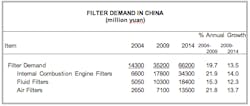Demand for filters in China is projected to grow 13.5 percent annually to 66.2 billion yuan in 2014, supported by rapid growth in motor vehicle and other transportation equipment production and stocks, and government policies that promote energy conservation and emission reductions, according to a report by the Freedonia Group. Growth in manufacturing output, building construction spending and urbanization of the population as industrialization efforts continue is also expected to stimulate demand for various types of filters.
As income levels grow, more people in China will be able to afford home water and air purification equipment. Freedonia says rising demand for higher-quality and extended-life filters will boost overall market value. In addition, growth is predicted to be aided by increased demand for newer products, such as motor vehicle cabin air filters and by the development of a significant aftermarket for these items.
Internal combustion engine filters account for the majority of Chinese filter demand and will post the strongest gains at 14 percent annually through 2014, driven by robust growth in the production and stock of motor vehicles and other transportation equipment, according to Freedonia. Sales of fluid filters are anticipated to be fueled by growth in nonagricultural water use and expanding urbanization in the nation. Meanwhile, sales of air filters are projected to rise 13.7 percent per year through 2014. Demand will be spurred by rising manufacturing output of both durable goods such as HVAC equipment, metal products and building construction materials, and nondurable goods such as chemicals and pharmaceuticals. Many of these manufactured products are either equipped with air filters or produced in manufacturing facilities with high air purification requirements.
Motor vehicles are expected to remain the largest filter market through 2014, when sales will reach 24.6 billion yuan due to the high volume of air intake, oil and fuel filters sold at the original equipment manufacturer level and as aftermarket products. Demand for filters in consumer and other markets will be fueled by increasing personal income levels and rising concerns about air and water quality. Filter demand in the manufacturing sector will benefit from increases in manufacturing activity. Utility filter market gains will be supported by the implementation of stricter air and water pollution regulations and the construction of numerous new power plants, water and wastewater treatment facilities, and waste incinerators.


